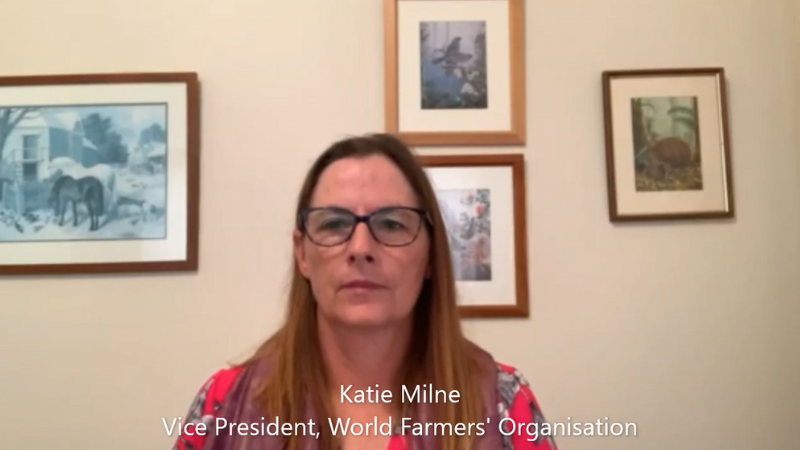On March 14, WFO Vice President Katie Milne brought the global women farmers’ perspective into the sixty-seventh session of the Commission on the Status of Women (CSW67).
She joined the CSW67 parallel event hosted by the WFO Member Indian Co-operative Network for Women Ltd (ICNW), titled: “Innovating Networks for Women’s Cooperative Leadership through Capacity Building-The International Network for Women in Cooperatives.”
The event focused on networking for women and the crucial role of women’s cooperatives in facing women’s critical issues and challenges to be represented at the higher echelons and decision-making levels. WFO Vice President started her speech by underlying, “women’s rights are not fully recognised, as evidenced by meeting women farmers around the globe. Women farmers feel incredibly biased in all systems, especially in rural areas and less developed nations. Women do not possess property rights, and their work is not valued and goes unrecognised”.
In this context, women’s cooperatives are vital in combating inequality and the lack of women’s representation in agricultural decision-making tables.
It is the same for the World Farmers’ Organisation: as stated in the WFO Policy on Women adopted by the WFO General Assembly in 2022, women and, through them, families, play a key role in food systems. Investing in the empowerment of rural women and girls can accelerate progress in rural development, farming, food security and nutrition while at the same time improving women’s and girls’ resilience to risks, including those caused by climate change.
The WFO is fully committed to supporting Women’s empowerment in Agriculture, as Ms Katie Milne remarked by saying that what emerged from our Women’s Committee and our policy is that “fostering women empowerment is the road to sustainability.”
Women are at the forefront of climate change mitigation and adaptation and are the most affected by its effects. They are totally committed to implementing the best disaster risk reduction strategies on their lands and in their communities, even if their work is too often unrecognised.
As remarked by ICNW President Dr Nandini Azad, women’s cooperatives can act as a tool that can transform poor and vulnerable women into successful entrepreneurs and leaders.
ICNW is a social movement reaching approximately 600,000 rural women members in four southern states of India. It supports leveraging petty loans to informal sector poor women engaged in 285 occupations, including farming.
During the parallel virtual event, some members of ICNW shared their successful stories, like the one from fisherwomen in Adiramapattinam who, thanks to ICNW cooperative support, have been able to repair fishing canals and become owners of fish marketing in the area.
